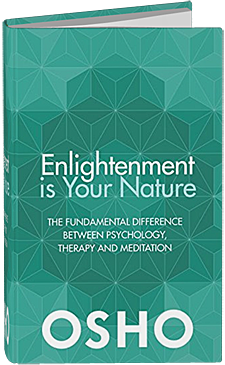Enlightenment Is Your Nature

Enlightenment Is Your Nature
The Fundamental Difference Between Psychology, Therapy, and Meditation
Book — Also available in other formats: eBook
"Enlightenment” in Western cultures has long been associated with the 18th century movement that brought about a new “age of reason.” As Zen, Buddhism, and other eastern wisdom traditions have captured the imagination of the West, “enlightenment” has come to be known as a specific state of consciousness attained by an individual on a spiritual or meditative path.
Chapter Titles
Preface: On the Neurosis of Becoming Human
#
PART 1: What is Enlightenment?
#1: Paradise Regained
#2: Peeling the Onion of Personality: Understanding Your Conditioning
#3: Inside and Outside the Box
#4: Waking Up Outside the Dream
#5: Now or Never
#
PART 2: Dialogues and Definitions: In Search of a Science of the Soul.
#6: Your Mind Is Not Yours
#7: Limitation of the Scientific Approach
#8: Just to be Normal Is Not Enough
#9: Consciousness, Unconsciousness and Wholeness
#
PART 3: The Psychology of the Buddhas in Action
#10: Awareness Is the Key
#11: Modern Methods for Modern Man
#12: Forget about Enlightenment
#13: Epilogue: Relax and Enlightenment Comes
Details
"Enlightenment” in Western cultures has long been associated with the 18th century movement that brought about a new “age of reason.” As Zen, Buddhism, and other eastern wisdom traditions have captured the imagination of the West, “enlightenment” has come to be known as a specific state of consciousness attained by an individual on a spiritual or meditative path.
Extract From: Enlightenment Is Your Nature
“Enlightenment is simply the process of becoming aware of your unconscious layers of personality and dropping those layers. They are not you; they are false faces. And because of those false faces, you cannot discover your original face. Enlightenment is nothing but the discovery of the original face: the essential reality you brought to you, and the essential reality you will have to take with you when you die. All these layers gathered between birth and death will be left here behind you.
“The man of enlightenment does exactly what death does to everybody, but he does it himself. He dies in a way and is reborn, dies in a way and is resurrected. And his originality is luminous because it is part of eternal life. It is a simple process of discovering yourself.
“You are not the container but the content. Discarding the container and discovering the content is the whole process of enlightenment.”
“The whole earth is yours, it need not be divided. And Christ and Buddha and Krishna are all yours, you need not be a Christian or a Hindu or a Mohammedan. The whole past is yours: use it, but don't be used by it. Use it, and go ahead. Use Buddha and Christ and Krishna and Zarathustra and Lao Tzu, but don't be confined by them. You have to go ahead. There is more to life, there are still unexplored realities. The mystery is infinite.
“Man is in a kind of neurosis. This is a very pregnant situation: either you fall back, or you jump ahead. Don't fall back. Falling back is not going to satisfy you, only growth satisfies, regression, never. Even if your childhood looks very, very beautiful, it is not going to satisfy you if you become a child again. You will be miserable, because you have known youth and the freedom of youth and the adventure of youth. To be a child again, in the old sense that you were once a child, will not make you happy. You will feel reduced, not enhanced.
“Man is in a kind of neurosis, because denied access to reality always produces insanity. By placing normal people in an abnormal situation we get abnormal behavior. Modern man is a revving engine without clutches, wheels or destination. Old destinations are no more relevant.
“Man has to learn something absolutely new, which has never been known before. Now, man has to learn to live in the herenow. Yes, a sense of direction is needed, but not a fixed goal. A significance is needed, but not a definite meaning. A destiny is not needed, a dignity is needed, freedom is needed. And man has to explore his freedom and decide on his own.”
In this title, Osho talks on the following topics:
englightenment… consciousness… meditation… psychology… science… mind… neurosis… Zen… Buddhism… personality
Details
More Information
Type Compilations
Publisher Watkins Publishing
ISBN-13 978-1786780492
Dimensions (size) 5.4 x 0.9 x 8.6 inches
Number of Pages 240
- Log in to post comments
- 38 views
